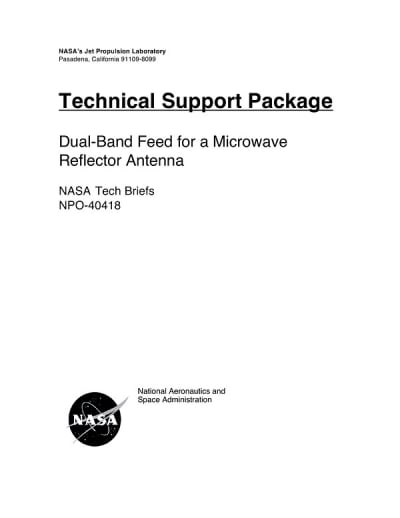A waveguide feed has been designed to provide specified illumination patterns for a dual-reflector antenna in two wavelength bands: 8 to 9 GHz and 30 to 40 GHz. The feed (see figure) has a coaxial configuration: A wider circular tube surrounds a narrower circular tube that serves as a waveguide for the signals in the 30-to-40-GHz band. The annular space between the narrower and the wider tube serves as a coaxial waveguide for the signals in the 8-to-9-GHz band. The nominal design frequencies of the outer and inner waveguides are 8.45 and 32 GHz, respectively.
 Each of the two waveguides is terminated in a component that is sized and shaped to help focus the radiation in its respective frequency band into the specified illumination pattern. For the outer waveguide, the beam-shaping termination is a corrugated horn; for the inner waveguide, the beam-shaping termination is a dielectric rod insert.
Each of the two waveguides is terminated in a component that is sized and shaped to help focus the radiation in its respective frequency band into the specified illumination pattern. For the outer waveguide, the beam-shaping termination is a corrugated horn; for the inner waveguide, the beam-shaping termination is a dielectric rod insert.
This work was done by Daniel Hoppe and Harry Reilly of Caltech for NASA’s Jet Propulsion Laboratory. For further information, access the Technical Support Package (TSP) free on-line at www.techbriefs.com/tsp under the Electronics/Computers category. NPO-40418
This Brief includes a Technical Support Package (TSP).

Dual-Band Feed for a Microwave Reflector Antenna
(reference NPO-40418) is currently available for download from the TSP library.
Don't have an account?
Overview
The document is a Technical Support Package for the Dual-Band Feed for a Microwave Reflector Antenna, identified as NPO-40418, published by NASA's Jet Propulsion Laboratory (JPL). It is part of NASA Tech Briefs, which disseminate information on aerospace-related developments with potential wider applications in technology, science, and commerce.
The primary focus of the document is to present the design and functionality of a dual-band feed system intended for use with microwave reflector antennas. This technology is significant in various applications, including telecommunications, satellite communications, and radar systems, where efficient signal transmission and reception are crucial.
The document outlines the technical specifications and advantages of the dual-band feed design, emphasizing its capability to operate effectively across two distinct frequency bands. This dual-band functionality allows for improved performance in communication systems, enabling simultaneous transmission and reception of signals at different frequencies, which can enhance data throughput and reliability.
Additionally, the Technical Support Package provides insights into the development process, including the methodologies employed in the design and testing phases. It highlights the innovative aspects of the technology, which may include advancements in materials, engineering techniques, and integration with existing systems.
For those seeking further information, the document includes contact details for the Innovative Technology Assets Management office at JPL, as well as resources for additional research and technology inquiries through the NASA Scientific and Technical Information (STI) Program Office. This ensures that interested parties can access further documentation and support related to the technology.
The document also includes a disclaimer regarding the use of the information provided, clarifying that neither the U.S. Government nor any representatives assume liability for its application. It emphasizes that any trade names or manufacturers mentioned are for identification purposes only and do not imply official endorsement by NASA.
In summary, this Technical Support Package serves as a comprehensive resource for understanding the dual-band feed technology for microwave reflector antennas, detailing its design, applications, and the potential benefits it offers in various fields. It reflects NASA's commitment to sharing technological advancements that can contribute to broader scientific and commercial endeavors.

